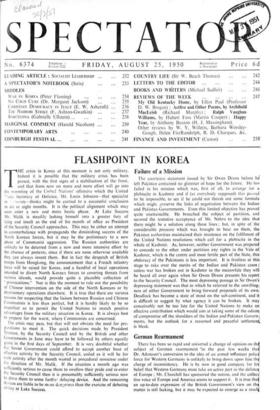Failure of a Mission
The courteous statement issued by Sir Owen Dixon before he; left Pakistan contained no glimmer of hope for the future. He has failed in his mission which was, first of all, to arrange for a plebiscite in Kashmir and if (as everybody supposed) this proved to be impossible, to see if he could not thrash out some formula which mighi preserve the links of negotiation between the Indian and Pakistan Governments. Even this limited objective has proved quite unattainable. He broached the subject of partition, and secured the tentative acceptance of Mr. Nehru to the idea that there might be a solution along these lines ; but, in spite of the considerable pressure which was brought to bear on them, the Pakistan authorities maintained their insistence on the fulfilment of the United Nations resolutions which call for a plebiscite in the whole of Kashmir. As, however, neither Government was prepared to concede to the other under partition any rights in the Vale of Kashmir, which is the centre and most fertile part of the State, this. obduracy of the Pakistanis is less important. It is fruitless at this, stage to rake over the merits of the Indian and Pakistan cases unless war has broken out in Kashmir in the meanwhile they wilt be heard all over again when Sir Owen Dixon presents his report to the Security Council. The most depressing passage in Sir Owen's depressing statement was that in which he referred to the unwilling ness of either Government to bring forward proposals of its own, Deadlock has become a state of mind on the sub-continent, and it is difficult to suggest by what agency it can be broken. It may conceivably not be too late for the United Nations to make an effective contribution which would aim at taking some of the odiui9 of compromise off the shoulders of the Indian and Pakistan Governi ments, but the outlook for a reasoned and peaceful settlement is bleak.






























